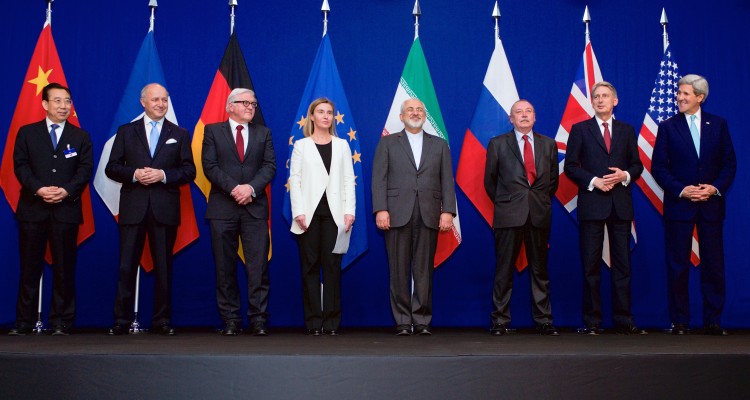A year after signing the nuclear deal, Iran appears to have fulfilled its obligations although it continues to fund terrorism around the world and is developing its ballistic missile program, the result of what some say is Obama’s failure at appeasement.
The Iran nuclear accord is still fragile a year into the deal.
Upcoming elections in both the US and Iran could yield new leaders determined to derail the deal. The Mideast’s wars pit US and Iranian proxies in conflict. Iran’s ballistic missiles are threatening American allies in the Middle East. Congressional opposition remains.
But for now, the seven-nation nuclear pact is holding. Washington and Tehran are expanding cooperation. And Boeing’s recent announcement of a multibillion-dollar plane deal with Iran Air suggests some of the agreement’s early problems may be getting resolved.
“It really wasn’t long ago that we saw a rapidly expanding nuclear program in Iran, only months away from having enough weapons-grade uranium to build 10 to 12 nuclear weapons, and we were on the cusp of confrontation,” Secretary of State John Kerry said recently.
“We have changed the strategic equation.”
One year ago, on July 14, 2015, the United States, six other world powers and Iran finalized almost two years of negotiations on the Joint Comprehensive Plan of Action. The pact outlined what Tehran had to do to pull back its nuclear program from the brink of weapons-making capacity. And it spelled out the West’s obligations to end many financial, trade and oil sanctions that had battered Iran’s economy.
Iran has reportedly lived up to its end of the deal so far. It shut down thousands of centrifuges for enriching uranium and exported almost its entire stockpile of the bomb-making material. It disabled a heavy water plant that would have produced plutonium usable in a weapon. It opened up its supply chain to far greater scrutiny. An underground enrichment facility near Fordo operates under strict limits.
Iran Still a Year Away from Nuclear Bomb
If Iran were to race now toward an atomic weapon, the Obama administration and most independent experts say it would need at least a year. The US and its partners — Britain, China, France, Germany and Russia — say that is enough time to discover the effort and intervene. Before the deal was struck, the timeframe for Iran to “break out” toward a bomb was a couple of months.
Iran’s compliance and the expanded breathing room have eliminated, for now, the threat of a military confrontation.
In the presidential campaign, discussion about the Iran deal focuses largely on the implications of the agreement and today’s limited US-Iranian cooperation, no longer on whether to attack Iran. Presumptive Democratic candidate Hillary Clinton backs the deal; GOP rival Donald Trump has spoken of “renegotiation.”
The situation is uneasy in Iran.
A year before elections, President Hassan Rouhani is under pressure to show his people the benefits of the agreement. Iran is struggling to attract big investments, with banks and companies fearful of US prosecution or fines.
June’s Boeing announcement, involving dozens of planes and worth as much as $25 billion, could open the floodgates — if it survives challenges from many of the same Republican and Democratic critics who opposed last year’s nuclear deal. Last week, the House passed two measures that would block the sale. The Senate hasn’t acted yet; if it does, Obama would likely veto the bill.
‘The Failure of Appeasement’
But Iranian threats to renege on the deal have the Obama administration on the defensive. It sees Rouhani’s success as critical to the accord’s survival. To that end, Kerry has lobbied European banks to make greater investments in Iran and US officials even have explored softening financial restrictions on Iran. Such considerations haven’t gone over well with Republican critics.
Obama’s Iran outreach is “a textbook example of the failure of appeasement,” House Speaker Paul Ryan, R-Wis., wrote in a 23-page national security agenda published last month.
Ballistic missiles pose another test.
The US bragged after the deal that it secured a key concession: Prolonging a UN ban on Iranian missile development by eight years. Tehran has flaunted the restriction, testing missiles capable of reaching Tel Aviv and bearing “Death to Israel” lettering. It has suffered few repercussions.
Administration officials say pressures on the nuclear deal make it that much more valuable. Iranian ballistic missiles would be more worrisome if carrying nuclear warheads, the argument goes. Syria’s bloody quagmire would be even harder to end if a nuclear-armed Iran were added to the equation.
“Measured by whether the agreement has prevented Iran from developing or obtaining a nuclear weapon, this deal has so far been successful,” said Sen. Chris Coons, a fence-sitting Democrat a year ago who ultimately backed the accord.
The nuclear deal’s future is “highly uncertain,” said Ariel Levite at the Carnegie Endowment for International Peace.
He outlined several potential paths forward. But even Iranian compliance poses a threat, because the deal could let Iran start ramping up nuclear activity again after eight years.
“The clock is steadily ticking — one year down, seven more to go,” Levite said.
By: Bradley Klapper, Associated Press





